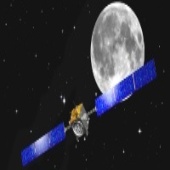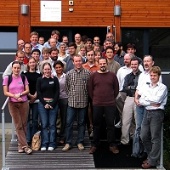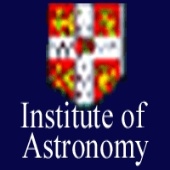ESA Science & Technology - News Archive
News archive
News archive
Using the computational power and flexibility of the GaiaGrid, a simulation corresponding to five years of Gaia observations of 1000 astrometric binary stars has been successfully completed.
Published: 17 November 2004
After a journey lasting 412 days SMART-1 has entered into orbit around the Moon. For the next two months the orbit will be refined until science operations begin in mid-January 2005.
Published: 16 November 2004
Scientists working on INTEGRAL and XMM-Newton, ESA's two high-energy observatories, have published details of recent observations on the galactic centre and a supernova.
Published: 9 November 2004
The fourteenth ADASS conference was held 24-27 October in Pasadena California, bringing together developers and users with a range of expertise in the production and use of software and systems.
Published: 1 November 2004
The discovery of a probable companion star of supernova SN1572A supports the theory of Type Ia supernovae originating in a binary system.
Published: 28 October 2004
The European solar community has a wealth of data of different nature and origin from its successful solar missions. Tackling the problem of accessing this large distributed dataset is the goal of the European Grid of Solar Observations.
Published: 27 October 2004
On 26 October, Cassini-Huygens will make its first close encounter with Titan. The flyby will take the spacecraft to an altitude of only 1200 kilometres from the surface of Saturn's largest moon, allowing for the first in-situ observations of Titan's atmosphere.
Published: 25 October 2004
The first INTEGRAL Data Analysis Workshop was organized by the INTEGRAL Science Data Centre (ISDC) on 5-9 October 2004. The workshop brought together PhD students as well as experienced researchers all wanting to learn more about INTEGRAL and how best to analyse the data from ESA's gamma-ray observatory.
Published: 22 October 2004
Published: 21 October 2004
The ESA Science and Technology website has a new area dedicated to providing educational support to the professional, formal, informal and home-schooling educator. The pages offer something for everyone from Early Years programmes to Special Needs and Life Long Learning.
Published: 21 October 2004
Using data from ESA's Hipparcos satellite, a team of European astronomers has discovered several groups of 'rebel' stars in the vicinity of our Sun, that move in peculiar directions caused by our galaxy's spiral arms.
Published: 20 October 2004
Published: 19 October 2004
Published: 18 October 2004
Between 4-7 October a symposium on the scientific aspects of the Gaia mission was held at the Observatoire de Paris. The meeting covered the current status of the Gaia mission and reviewed recent working group studies.
Published: 13 October 2004
During the 8th Cluster joint ESA-NASA workshop, several key topics were discussed in four working groups, covering the important physical processes in the Earth's magnetosphere and the plasma environment of near Earth space.
Published: 5 October 2004
The Venus Express spacecraft has been undergoing extensive testing over the summer at the Alenia facility in Torino. The spacecraft is now ready for shipment to Toulouse to undergo environmental tests.
Published: 5 October 2004
Published: 20 September 2004
A team of European and American scientists has produced a series of results on the flow of interstellar helium atoms within the solar system. This flow is created by the Sun's motion inside the Local Interstellar Cloud of gas and dust.
Published: 20 September 2004
—
20 Items per Page


















